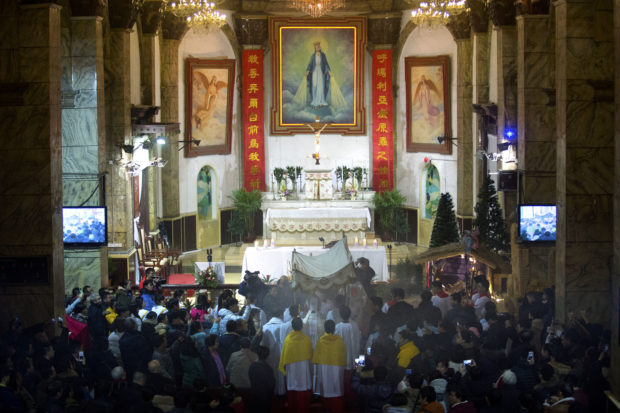
In this Dec. 24, 2015 photo, a Christmas Eve mass is held at the Southern Cathedral, an officially-sanctioned Catholic church in Beijing. The Vatican’s efforts to heal a decades-long rift with China appear to have stalled, with each side still unwilling to accept controversial bishops appointed by the other. In recent months, Beijing has appeared to take a harder line toward believers, and has ordered the country’s estimated 12 million Catholics to shun foreign influence and to “Sinosize” their Church. (AP Photo/Mark Schiefelbein)
BEIJING — The Vatican’s efforts to heal a decades-long rift with China appear to have stalled, with each side still unwilling to accept controversial bishops appointed by the other.
In recent months, Beijing has appeared to take a harder line toward believers, and has ordered the country’s estimated 12 million Catholics to shun foreign influence and to “Sinosize” their Church.
Meanwhile, the ruling Communist Party is again telling members that atheism remains a core value, not to be transgressed.
The developments mark a shift from just over a decade ago, when Pope Benedict XVI penned a landmark letter to the church in China that was seen as an impetus toward improving ties.
That goal now appears to have bleak prospects, according to priests and people with knowledge of China-Vatican relations both inside and outside China. Many spoke on condition of anonymity to avoid damaging their relations with either side.
“Recently, the news we hear is not so good,” said Jeroom Heyndrickx, of Belgium’s Catholic University of Leuven, who has sought to foster informal cultural exchanges between the church and China.
Chinese officials who manage religious groups and the official Chinese Patriotic Catholic Association did not respond to requests for interviews.
China and the Vatican have had no formal relations for nearly seven decades, since Beijing ordered Chinese Catholics to cut ties with the Holy See soon after the foundation of the Communist state in 1949. Years of persecution followed, until Mao Zedong’s death 40 years ago let to the reopening of churches and freeing of imprisoned priests, some for decades, under the party’s anti-foreign and anti-religious policies. Popes from John Paul II onward have expressed hope for restoring diplomatic ties.
In his 2007 letter, Benedict XVI urged Beijing to restore ties and permit religious freedom, while inviting Chinese Catholics worshipping in both the state-controlled aboveground and the oft-persecuted clandestine underground churches to unite under his jurisdiction. He called the state-run Catholic Church “incompatible” with Catholic doctrine, but nevertheless made unprecedented overtures toward it.
The sides worked for years to reach agreement on the issue of ordaining bishops, which the Vatican traditionally has held as its right. The unwritten agreement, however, allowed Beijing to pick candidates that the Holy See would consider and then tacitly endorse. Though the deal wasn’t always adhered to, it generally prevented Beijing from appointing bishops that the Vatican would consider flawed for personal or doctrinal reasons.
Yet the sides now appear deadlocked over a small number of serving bishops who weren’t sanctioned by the Holy See, as well as bishops who have been serving underground congregations not recognized by the official Catholic Association. Sources generally say there are two or three bishops the Vatican considers unacceptable.